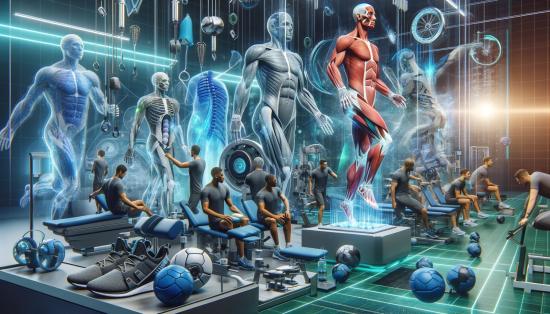
Recovery Essentials: Innovations in Sports Medicine
Explore the latest advancements in sports medicine and healthcare, including innovative treatments and recovery techniques for athletes.
Sports medicine plays a crucial role in the healthcare of athletes, focusing on prevention, diagnosis, treatment, and rehabilitation of sports-related injuries. It encompasses a wide range of disciplines, including orthopedics, physical therapy, nutrition, and psychology, to provide a holistic approach to athlete care. By addressing both the physical and psychological aspects of sports injuries, sports medicine aims to optimize athlete performance and promote long-term well-being. With the rapid advancements in technology, sports medicine has seen a surge in innovative treatments, such as regenerative medicine, minimally invasive surgeries, and personalized rehabilitation programs. Additionally, the use of wearables and data analytics has enabled more accurate monitoring of athletes' physical condition and performance, leading to more effective injury prevention and recovery.
The evolution of sports medicine has seen a significant shift towards an interdisciplinary approach, encompassing a wide range of healthcare professionals working together to optimize athlete performance and recovery. This approach involves collaboration between physicians, physiotherapists, nutritionists, psychologists, and trainers, among others, to provide comprehensive care for athletes. By integrating expertise from different disciplines, sports medicine aims to not only treat injuries but also prevent them and enhance overall athletic performance. This holistic approach to healthcare for athletes has revolutionized the field, leading to more effective treatments and innovative strategies for recovery and injury prevention.
As sports medicine continues to advance, there are exciting new treatments and technologies emerging for sports injury recovery. These cutting-edge treatments include regenerative medicine, such as platelet-rich plasma therapy and stem cell injections, which can help accelerate healing and reduce recovery time for athletes. Additionally, there is a growing focus on the use of alternative therapies like acupuncture and chiropractic care to improve musculoskeletal function and overall performance. Advanced imaging techniques, such as MRI and ultrasound, are also being integrated into sports medicine to provide more precise diagnosis and treatment planning. Overall, these innovative approaches are revolutionizing the way athletes recover from injuries and enhancing their overall well-being and performance.
In today's sports medicine, technology plays a crucial role in optimizing athlete performance and recovery. Wearable devices such as fitness trackers and smart clothing provide real-time data on an athlete's heart rate, movement, and other vital parameters, allowing for personalized training and injury prevention. In addition, data analytics software can process large amounts of information to identify patterns and trends, helping medical professionals make more informed decisions about treatment and rehabilitation. These technological advancements have revolutionized the way sports injuries are managed, leading to faster recovery times and improved long-term outcomes for athletes.
The psychological aspect of sports medicine plays a crucial role in athlete recovery. Athletes often face immense pressure to perform at their best, which can lead to high levels of stress and anxiety. Sports medicine professionals must address these psychological factors in order to support athletes in their recovery process. By understanding the psychological impact of injuries and the rehabilitation process, healthcare providers can tailor their approach to better meet the needs of the individual athlete. This may involve implementing techniques such as cognitive-behavioral therapy, mindfulness practices, and stress management strategies. By addressing the psychological component of recovery, sports medicine professionals can help athletes not only physically heal from their injuries, but also maintain a positive mindset throughout the rehabilitation process.
Nutrition plays a crucial role in sports medicine and athlete performance. The right balance of nutrients can enhance an athlete's energy levels, optimize recovery, and improve overall health. Carbohydrates, proteins, fats, vitamins, and minerals are essential components of a well-rounded diet for athletes. It's important to consider the timing of meals and snacks, as well as hydration, to support optimal training and performance. Working with a sports nutritionist or dietitian can help athletes customize a nutrition plan to meet their specific needs and goals. With the right nutrition, athletes can maximize their potential and improve their overall well-being.
Presenting case studies of successful sports medicine interventions is an essential step in understanding the practical application of various treatment modalities. By examining real-life scenarios where athletes have benefited from advanced medical techniques and therapies, healthcare professionals can gain valuable insights into what works best in different situations. Case studies offer a glimpse into the effectiveness of interventions such as regenerative medicine, physiotherapy, and minimally invasive surgical procedures, showcasing how these approaches can lead to improved patient outcomes and shortened recovery times. Additionally, they provide a platform for sharing best practices and fostering collaboration among healthcare providers in the sports medicine field.
As we look to the future of sports medicine and healthcare, it's clear that the field is poised for significant growth and innovation. With advancements in technology, such as wearable devices and data analytics, healthcare providers will have access to more information than ever before about athlete performance and recovery. This data-driven approach will enable personalized treatment plans and more effective rehabilitation strategies. Additionally, the integration of psychology and nutrition into sports medicine will further optimize athlete recovery and performance. As the industry continues to evolve, we can expect to see a greater emphasis on holistic care that addresses the physical, mental, and emotional well-being of athletes. Overall, the future of sports medicine and healthcare holds great promise for improving the lives and performance of athletes at all levels.
Related posts









